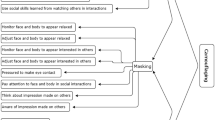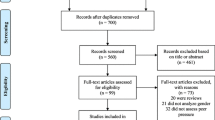Abstract
Empathy has been accepted as a crucial factor in the development of prosocial thought and behavior. This study attempted to clarify the role of empathy in the development of antisocial and aggressive delinquent behavior. The subjects were 331 delinquents and 64 nondelinquent controls ages 12 to 18. The delinquents were found to be significantly delayed or arrested in the development of empathy. The nondelinquent group exhibited a significant age-related increase in empathy during the adolescent period, whereas the delinquent group did not. Of three delinquent subgroups utilized, the neurotics were least empathic, the psychopathics next, and the subculturals the most empathic; the groups differed significantly from each other. Aggressive delinquents were significantly lower in empathy level than nonaggressive delinquents, though differentiation by type of aggression (person or property) was not significant.
Similar content being viewed by others
References
Aleksic, P. A study of empathie inhibition of aggression in juvenile delinquents (Doctoral dissertation, Miami University, 1975).Dissertation Abstracts International, 1976,36, 4675–4676-B. (University Microfilms No. 76-6602)
Borgatta, E., & Corsini, R. The quick word test.Journal of Educational Research, 1960,54, 15–20.
Braunstein, R. Empathy, impulse control, and overt aggression in children (Doctoral dissertation, Temple University, 1974).Dissertation Abstracts International, 1975,35, 2986B. (University Microfilms No. 74-28, 214)
Eisenberg-Berg, N., & Mussen, P. Empathy and moral development in adolescence.Developmental Psychology, 1978,14, 185–186.
Feshbach, N. Empathy in children: Some theoretical and empirical considerations.Counseling Psychologist, 1975,5, 25–30.
Feshbach, N., & Feshbach, S. The relationship between empathy and aggression in two age groups.Developmental Psychology, 1969,1, 102–107.
Feshbach, N., & Roe, K. Empathy in six and seven year olds.Child Development, 1968,34, 133–145.
Flavell, J., Botkin, P., Fry, C., Wright, J., & Jarvis, P.The development of role-taking and communication skills in children. New York: Wiley, 1968.
Hickey, J. The effects of guided moral discussion upon youthful offenders' level of moral judgement (Doctoral dissertation, Boston University, School of Education, 1972).Dissertation Abstracts International, 1972,33, 1551A. (University Microfilms No. 72-25, 438.
Hoffman, M. Empathy, role-taking, guilt, and development of altruistic motives. In T. Lickona (Ed.),Moral development and behavior: Theory research, and social problems. New York: Holt, Rinehart & Winston, 1975.
Hoffman, M. Sex differences in empathy and related behaviors.Psychological Bulletin, 1977,84, 712–722.
Hoffman, M. Empathy, its development and prosocial implications.1977 Nebraska Symposium on Motivation, 1978,25, 169–217.
Hogan, R. Development of an empathy scale.Journal of Consulting and Clinical Psychology, 1969,33, 207–216.
Hogan, R. Moral conduct and moral character: A psychological perspective.Psychological Bulletin, 1973,79, 217–232.
Hogan, R. Empathy: A conceptual and psychometric analysis.Counseling Psychologist, 1975.5, 14–18.
Hoppe, C., & Singer, R. Overcontrolled hostility, empathy, and egocentric balance in violent and nonviolent psychiatric offenders.Psychological Reports, 1976,39, 1303–1308.
Iannotti, R. The nature and measurement of empathy in children.Counseling Psychologist, 1975,5, 21–25.
Iannotti, R. Effect of role-taking experiences on role-taking, empathy, altruism, and aggression.Developmental Psychology, 1978,14, 119–124.
Jurkovic, G., & Prentice, N. Relation of moral and cognitive development to dimensions of juvenile delinquency.Journal of Abnormal Psychology, 1977,86, 414–420.
Kendall, P., Deardorff, P., & Finch, A. Empathy and socialization in first and repeat offenders and normals.Journal of Abnormal Child Psychology, 1977,5, 93–97.
Kohlberg, L. Stages and sequences: The cognitive-developmental approach to socialization. In D. Goslin, (Ed.),Handbook of socialization theory and research. Chicago: Rand McNally, 1969.
Kurtines, W., & Hogan, R. Sources of conformity in unsocialized college students.Journal of Abnormal Psychology, 1972,80, 49–51.
McColgan, E. Social cognition in delinquent, predelinquent, and nondelinquent adolescents. (Doctoral dissertation, University of Minnesota, 1975).Dissertation Abstracts International, 1976,37, 199A. (University Microfilms No. 76-14, 931)
Mehrabian, A., & Epstein, N. A measure of emotional empathy.Journal of Personality, 1972,40, 525–543.
Peterson, D. R., Quay, H. C., & Cameron, G. R. Personality and background factors in juvenile delinquency as inferred from questionnaire responses.Journal of Consulting Psychology, 1959,23, 395–399.
Quay, H. C., & Parsons, L. B.The differential behavioral classification of the juvenile offender. Washington, D.C.: U.S. Bureau of Prisons, 1971.
Quay, H. C., Peterson, D., & Consalvi, G. The interpretation of three personality factors in juvenile delinquency.Journal of Consulting Psychology, 1960,24, 555.
Rotenberg, M. Conceptual and methodological notes on affective and cognitive role-taking (sympathy and empathy): An illustrative experiment with delinquent and nondelinquent boys.Journal of Genetic Psychology, 1974,125, 177–185.
Shantz, C. Empathy in relation to social cognitive development.Counseling Psychologist, 1975,5, 18–21.
Author information
Authors and Affiliations
Additional information
This research was based on the author's doctoral dissertation. The author wishes to express his appreciation to Dr. Henry R. Angelino, Dr. Charles Wenar, and Dr. John Gibbs of the Ohio State University for their support and guidance.
Rights and permissions
About this article
Cite this article
Ellis, P.L. Empathy: A factor in antisocial behavior. J Abnorm Child Psychol 10, 123–133 (1982). https://doi.org/10.1007/BF00915957
Revised:
Issue Date:
DOI: https://doi.org/10.1007/BF00915957




